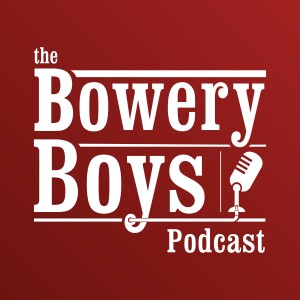
#430 The Story of Flushing: Queens History, Old and New
 2024-04-12
2024-04-12
Few areas of the United States have as endured as long as Flushing, Queens, a neighborhood with almost over 375 years of history and an evolving cultural landscape that includes Quakers, trees, Hollywood films, world fairs, and new Asian immigration.
In this special on-location episode of the Bowery Boys, Greg and special guest Kieran Gannon explore the epic history of Flushing through five specific locations -- the Bowne House, Kingsland Homestead (home of the Queens Historical Society), the Lewis Latimer House Museum, Flushing Meadows-Corona Park and a downtown dumpling restaurant named Old Captain's Dumplings.
Built on the marshy banks of Flushing Creek, the original Dutch village of Flushing (or Vlissingen) was populated by English settlers, Quakers like John and Hannah Bownewhose home became one of America's first Quaker meeting places -- and the site of a religious struggle critical to the formation of the future United States.
By the early 19th century, Flushing was better known for its tree and shrub nurseries which would introduce dozens of new plant species to North America. After the Civil War, Flushing became a weekend getaway and commuter town for the residents of western Long Island. The former civic center of town -- the 1862 Flushing Town Hall -- is still a vibrant performance venue today.
The creation of the borough of Queens in 1898 brought surprising changes to Flushing -- from the arrival of the early silent-film industry to the development of new parks and highways (thanks to our old friend Robert Moses).
But the most stunning transformation of all came after 1965 when American immigration quotas were eliminated and Flushing gained thousands of new residents from China, Taiwan, Korea, India, and other South Asian countries.
More Episodes
 2010-02-05
2010-02-05
 5
5
 2010-01-29
2010-01-29
 3
3
 2010-01-22
2010-01-22
 13
13
 2009-12-25
2009-12-25
 10
10
 2009-12-11
2009-12-11
 14
14
 2009-11-13
2009-11-13
 6
6
 2009-10-23
2009-10-23
 4
4
 2009-10-09
2009-10-09
 27
27
 2009-09-13
2009-09-13
 1
1
 2009-08-14
2009-08-14
 15
15
 2009-08-01
2009-08-01
 20
20
 2009-07-17
2009-07-17
 3
3
 2009-07-02
2009-07-02
 3
3
 2009-06-05
2009-06-05
 6
6
 2009-05-08
2009-05-08
 22
22
 2009-04-24
2009-04-24
 1
1
 2009-04-10
2009-04-10
 4
4
Create your
podcast in
minutes
- Full-featured podcast site
- Unlimited storage and bandwidth
- Comprehensive podcast stats
- Distribute to Apple Podcasts, Spotify, and more
- Make money with your podcast
It is Free
- Privacy Policy
- Cookie Policy
- Terms of Use
- Consent Preferences
- Copyright © 2015-2024 Podbean.com


